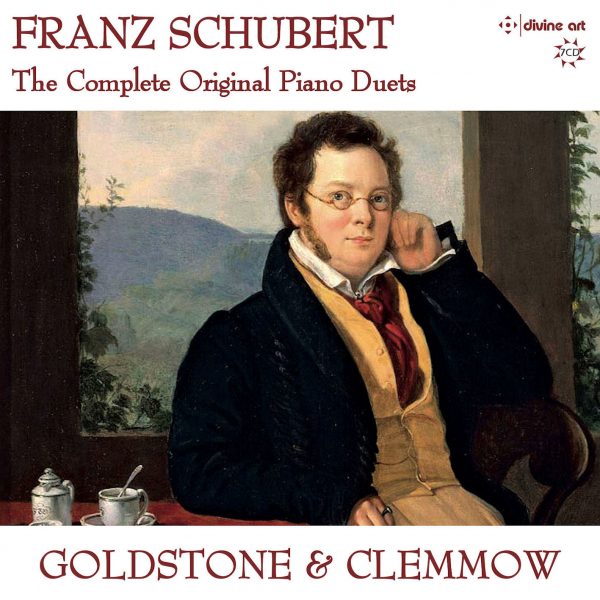American Record Guide
The title is “The Complete Original Piano Duets” and each of the seven discs is one complete recital, 75 to 80 minutes long. Each ends with an encore piece or two from the early set of Polonaises for piano duet by Robert Schumann. All were individually released back in 1999 but are now remastered and repackaged in a deluxe box, available for less than $40. The superlative 31-page booklet essay by the pianists was written for the original releases. After 33 years as a duo—the last 28 of them as husband and wife— and about 40 CDs, Goldstone’s death in January 2017 means that there will be no more.
The material is very well arranged, with a balance between shorter and longer works, varied musical styles, and complementary key relationships. The three ‘Heroic’ Marches and six ‘Grand’ Marches are distributed over several programs; the best-known ‘March Militaire’ is presented with its two companion marches—a beautifully balanced set. Schubert’s two sets of Polonaises, which were a strong influence on Schumann are likewise broken up over many programs. There is at least one of the best-known large scale works in each recital. Some of these take on symphonic dimensions, with lengths from 15 to 36 minutes. The Grand Duo, Fantasy in F minor, French and Hungarian Divertissements, the Lebenssturme Duo, and the Variations on an Original Theme in A-flat are all recognized masterpieces.
Of course in as complete a set as this one, there are unfamiliar works, many of significance. There are three other fantasies besides the famous late composition in F minor. At 6, 17, and 22 minutes, these earlier ones point the way to the later masterpiece. Early Schubert means he was 14-16 years old. Late Schubert was only 15 years later. I suppose we have to be thankful for the 31 years Schubert lived and not bemoan what might have been.
The performances may justly be considered among the best by one of the best piano duos. Eight hours of Schubert duets may seem like a lot, but I have been through these three times, and every hearing reveals other beautiful musical moments. Goldstone and Clemmow take perfection of ensemble to its summit. The little things, like placing emphasis on an important chord with a barely perceptible break and minuscule tempo relaxations at the end of phrases, are all done as one. Although they do face some strong competition in the best-known works, taken as a whole there is no competition.
@divineartrecordingsgroup
A First Inversion Company
Registered Office:
176-178 Pontefract Road, Cudworth, Barnsley S72 8BE
+44 1226 596703
Fort Worth, TX 76110
+1.682.233.4978
We noticed you're visiting from Latvia. We've updated our prices to Euro for your shopping convenience. Use Pound sterling instead. Dismiss



![🎧 Listen now to the @purcellsingers' first single from their upcoming album, #ASpotlessRose! ➡️ listn.fm/aspotlessrose [in bio]](https://scontent-dfw5-2.cdninstagram.com/v/t51.71878-15/642752592_1424641949105789_8815810652567824072_n.jpg?stp=dst-jpg_e35_tt6&_nc_cat=106&ccb=7-5&_nc_sid=18de74&efg=eyJlZmdfdGFnIjoiQ0xJUFMuYmVzdF9pbWFnZV91cmxnZW4uQzMifQ%3D%3D&_nc_ohc=1oI-Pe3rGJ4Q7kNvwFuPavQ&_nc_oc=Admxakq29BndUa6pnjok8Yx2ODSgjofJzae69OZEwYWqUgroY6bUAEfVyUo5yPMllHQ&_nc_zt=23&_nc_ht=scontent-dfw5-2.cdninstagram.com&edm=ANo9K5cEAAAA&_nc_gid=a3nX7ks7DKGt90lzF9QWrw&_nc_tpa=Q5bMBQHXKbrxeE0vOIGeufGzXfG9MXmQrnig5xJtpQES2RfusWZjQVGaiaohnNX32-o_JsNF-DT-qAe6pw&oh=00_AfubZes2lnYVC2sGtgQNskVh17lpxSVwCzGTLVWtPp2swQ&oe=69A95641)








